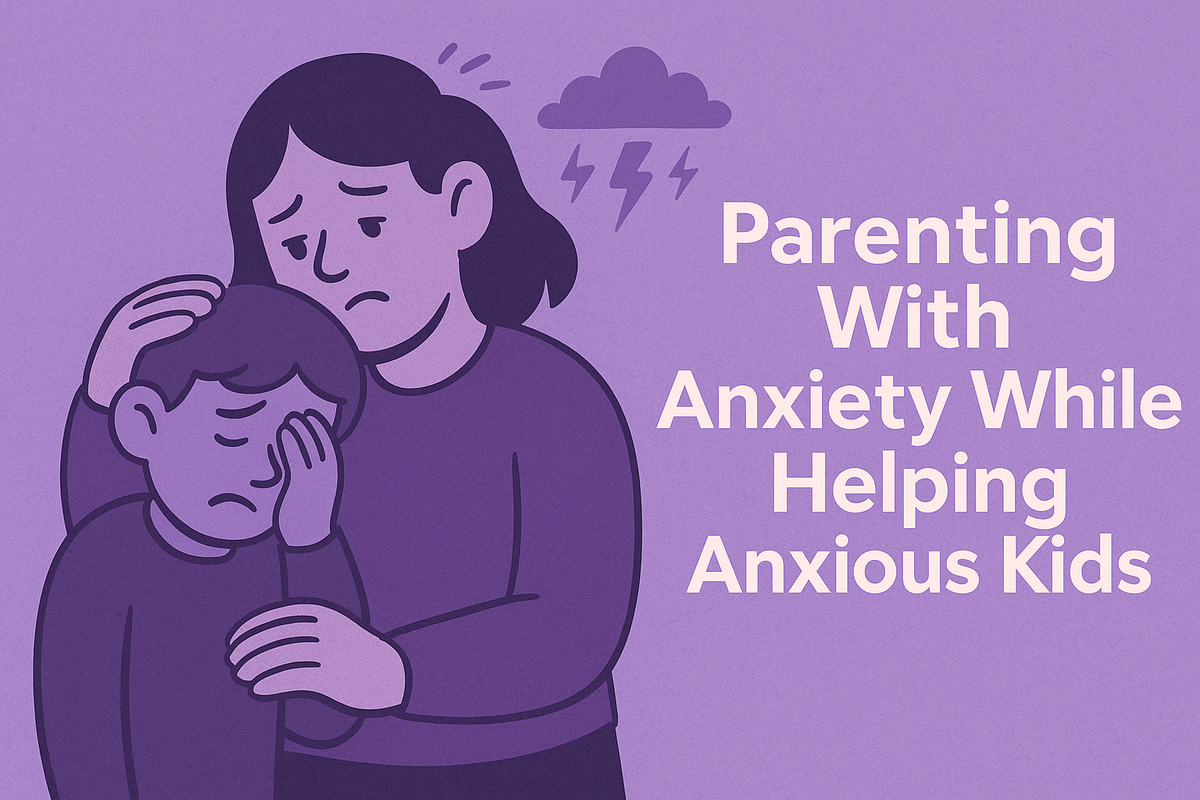Parenting With Anxiety While Helping Anxious Kids

Parenting is already a full-time emotional job, but when you’re battling your own anxiety while raising an anxious child or teen, it’s like trying to be a lighthouse in a storm while also trying not to sink. You want to support them through every panic attack, every meltdown, every bedtime spiral. But who’s supporting you? This guide is for parents navigating the emotional highwire act of parenting with anxiety, while also trying to be present and safe for their anxious kids. You’re not alone, and you’re not failing. Let’s talk about how to support them and you—without burning out.
Recognizing the Double Load
You’re parenting with anxiety, not just parenting through it. That means your brain is constantly scanning for danger, worst-case scenarios, or feelings of inadequacy—and then your child’s anxiety brings another layer. It’s not weakness. It’s a heavy load.
You may feel guilt for struggling, shame for losing patience, or exhaustion from masking how overwhelmed you are. The first step is naming it: You are carrying two emotional weights, and that deserves compassion.
When you normalize your own anxiety, it becomes easier to model emotional honesty for your child. They need to see that emotions aren’t flaws—they’re data. And managing anxiety isn’t about perfection, it’s about awareness and growth.

Parenting tip: Help calm your nervous system and get deeper rest with this weighted blanket.

Parenting tip: A guided way to track thoughts and moods without overthinking: The Anti-Anxiety Notebook.
Understanding What Anxiety Looks Like in Teens
Teen anxiety doesn’t always look like what you expect. It’s not just crying or shaking—it might be snapping at you, refusing to do homework, spending hours in their room, or shutting down completely. Some anxious teens appear angry or lazy when they’re really overwhelmed.
Common signs:
- Avoidance of social situations or school
- Difficulty sleeping or constant fatigue
- Complaints of stomachaches or headaches
- Reassurance-seeking or perfectionism
- Sudden mood shifts or irritability
Understanding your teen’s triggers and behavior is step one. Avoid assuming they’re “just being dramatic.” Anxiety is real, and it often shows up as defiance, silence, or constant ‘what ifs.’

Parenting tip: Get this Sensory Fidget Kit, perfect for teens who need to self-soothe during school or downtime.

Parenting tip: A teen-friendly anxiety toolkit with exercises that don’t feel “babyish”.
Helping Without Hovering
Parents of anxious kids often feel the urge to jump in and fix everything. This comes from love—but it can accidentally send the message that your child isn’t capable of handling hard things.
Instead of rescuing every time:
- Validate their feelings: “That sounds really hard.”
- Ask what support they want: “Do you want help or just to vent?”
- Coach, don’t control: Teach them to break tasks down, manage time, breathe through panic.
It’s okay to be involved, but avoid reinforcing avoidance. Gradual exposure to stressors (with support) helps them build confidence.
And remember: letting them struggle a little doesn’t mean you’re a bad parent—it means you’re helping them grow.

Parenting tip: This machine can help with sleep and relaxation for both you and your teen.
Regulating Yourself First
This part is hard, especially when you’re already anxious. But your nervous system sets the tone. If you’re dysregulated, it’s nearly impossible to help your child regulate theirs.
When your teen is spiraling and your heart is racing too, pause:
- Take a breath before responding
- Say, “I need a minute to calm myself” if needed
- Ground yourself with cold water, deep breathing, or counting objects
You’re allowed to take space. You’re allowed to not have the perfect reaction. What matters is showing your teen that regulation is a skill—not a personality trait.
Model self-compassion out loud:
- “I’m feeling anxious, but I know this will pass.”
- “It’s okay to be overwhelmed. I’m allowed to rest.”
When your child sees you pause, name your emotion, and self-soothe, they learn that emotional regulation isn’t magic—it’s practice.
Creating an Emotionally Safe Home
You can’t prevent anxiety, but you can build a home where emotions aren’t punished or feared. This is where real healing begins.
Make space for emotion:
- No emotion is “too much” or “bad”
- Validate without immediately trying to fix
- Avoid minimizing (e.g., “It’s not that big of a deal”)
Create rituals that help:
- Weekly check-ins (“How’s your heart?”)
- Calm-down spaces with sensory tools
- Family breathing breaks or low-pressure game nights
Also, set clear but flexible boundaries. Anxious kids need consistency, but also need to feel seen and safe—not controlled.

Parenting tip: Set the mood for regulation, rest, and routine.
When to Seek Extra Support
Sometimes, anxiety in teens and parents alike becomes too much to handle alone—and that’s okay. Therapy isn’t a last resort, it’s a gift.
Signs your teen may need professional help:
- Panic attacks or severe avoidance
- Self-harm or intrusive thoughts
- Disordered eating patterns
- Constant physical complaints with no medical cause
Signs you might need support:
- You feel resentful, hopeless, or emotionally numb
- Your anxiety makes daily parenting feel unbearable
- You’re using coping mechanisms that hurt more than help
There’s no shame in getting therapy, meds, or coaching. It’s brave. It’s proactive. And it models to your teen that seeking help is strength—not failure.

Parenting tip: Just a little reminder that you’re showing up, even when it’s hard.

Parenting tip: A raw and honest read for anxious parents supporting anxious kids.
You’re Allowed to Be a Work in Progress
You don’t have to be a calm guru to raise emotionally healthy kids. You don’t have to have all the answers. What you do need is presence, honesty, and a willingness to repair.
When you mess up—and you will—apologize. Say, “I was really overwhelmed earlier. I didn’t handle that well, and I’m working on it.” This builds trust and shows your child that imperfection is human.
Your anxiety doesn’t disqualify you from being a good parent. If anything, it makes you more empathetic, more attuned, more capable of understanding emotional nuance.
You’re not parenting wrong. You’re parenting with anxiety. That’s a different path—but it’s still valid, still brave, and still enough.
Conclusion: Parenting Through It, Not Past It
You’re not trying to get rid of your anxiety or your child’s overnight. You’re learning how to navigate life alongside it—and that’s the real goal.
Keep showing up. Keep breathing through the hard parts. Keep building a home where both of you feel safe to be human.
Parenting teens with anxiety while managing your own isn’t a failure. It’s the definition of resilience.
You’re not behind. You’re not too much. You’re exactly what your child needs—an anxious, real, loving guide helping them grow while healing alongside them.
And if today was hard? That’s okay. Tomorrow is another chance to lead with compassion, again.
By: Jess E
